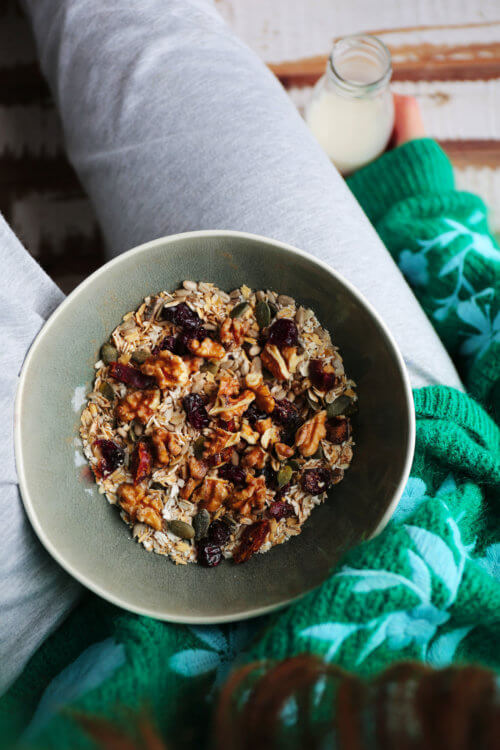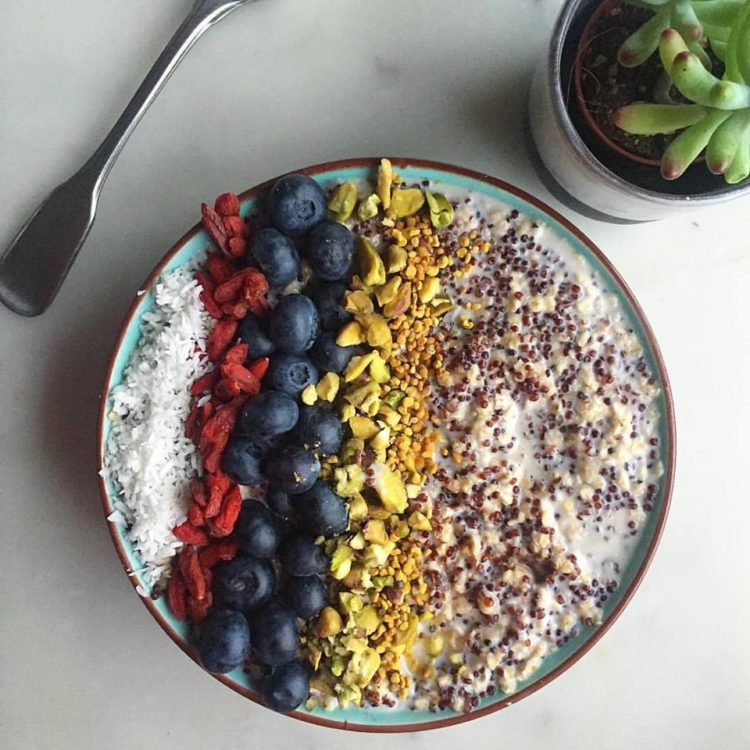
Gut Health
Hi Guys,
So, you may remember I was in Ibiza in October for a health trip focusing on the importance of gut health. The trip was through Renew Life and I learned so much. We got to practice yoga, do lots of breathing exercises, eat LOTS of delicious food, learn about fermentation and relax – all of which play a key role for a healthy gut.
As I’m not an expert in the area I thought it would be useful to ask Dr. Sara Celik, Naturopathic Doctor and Spokesperson for Renew Life to share some information on gut health. I asked you to share your questions with me about what you would love to know about gut health and Dr. Sara has answered your questions below.

First off, to give a quick intro to gut health, here is a snapshot:
The gut is like the engine in a car. Without a well operating engine, a car is not going to get very far. Since the gut impacts so many systems in the body (e.g. immune system, cardiovascular system, nervous system), it’s important to take good care of the gut by eating natural whole foods, getting adequate fibre/water, and maintaining a healthy balance of gut flora.
A healthy gut environment can lower inflammation, increase the absorption of vitamins and minerals, and support a healthier immune system (since 70-80% of the immune system is in the gut).

What are the signs of an unhealthy gut?
There are many conditions that may be linked to a poor digestive system. Besides the obvious gut-related symptoms such as gas, bloating, constipation, and diarrhea, other signs/symptoms may also point to an unhealthy gut.
For example, skin problems such as acne and eczema may indicate toxicity in the gut or low numbers of beneficial gut bacteria.
A few other symptoms that may indicate an unhealthy gut include:
- Headaches/Migraines
- Fatigue
- Depression/Anxiety
- Always getting sick
- Difficulty losing weight or maintaining a healthy weight
- Brain fog or reduced ability to focus
- Weak hair and nails
What are your top 5 tips for a healthier gut? (general tips)
- Fibre – aim for 30-40 grams of fibre per day choosing a variety of foods: avocado, chia seeds, flax seeds, and fruits/vegetables. You can also opt for a fibre supplement that is 50% soluble and 50% insoluble fibre. A powdered fibre supplement that is free of additives and colours can be added to water or energy boosting smoothies.
- Sleep – aim for 6-8 hours of sleep per night. It’s most important to get uninterrupted sleep, so you awake feeling well rested. If you are having trouble falling asleep, work with your healthcare professional to identify and treat the root cause.
- Live Bacteria – the gut is home to trillions of microbes and these “good” bugs are easily destroyed by our modern-day lifestyle (e.g. poor nutrition, stress, and the overuse of medications). To maintain healthy gut flora, consider a high potency, multi-strain live bacteria supplement with at least 50 billion active bacterial cultures. Recent evidence suggests the change in gut flora while taking a probiotic supplement can happen in just 3-4 days.
- Stress – we all have a nerve called the vagus nerve which connects from the brain to organs in the body, including the gut. What we “think” in our brains can directly impact our gut health, so managing stress is important if you want a healthier gut. Yoga, meditation, and nature walks are some suggestions to consider.
- Fermented Foods – aim for a variety of fermented foods such as pickled vegetables (e.g. beets, carrots, cauliflower), sauerkraut, kimchi, kefir or kombucha (a fermented tea beverage).
What are the top 5 foods for a healthier gut?
- Pickled Beets — rich in probiotic bacteria that supports a healthier gut. Pickled beets can be added to any salad.
- Flax Seeds or Chia Seeds — a good source of fibre that help move the bowels and a healthy source of the omega-3 fatty acid, ALA (alpha-linolenic acid).
- Garlic and Onions — garlic and onions act as prebiotics by fueling the probiotics. They also help destroy pathogenic bacteria.
- Yacon Root – is a healthier alternative to white potatoes and is good for the gut. It contains fructooligosaccharides (FOS), which act as food for probiotic bacteria.
- Seaweed – is another food that is rich in antioxidants and prebiotics.

Are there tests you can do to test your gut health?
There are a number of tests that can be done from food intolerance tests to gut mapping stool tests. Tests are available through healthcare professionals such as naturopathic doctors.
If you are interested in exploring the complex world of bacteria that exists within your digestive tract, check with your doctor to see if they offer comprehensive gut microbiome stool analysis.
Is there a particular diet that you recommend for a better balance of good v bad bacteria?
Yes. It’s important to choose natural whole foods and aim for a diet rich in dark green vegetables, lean protein, and good fats (e.g. olive oil and avocado). Consuming carbs, sugars, and yeast-promoting foods tend to feed the “bad” bacteria while starving the good.
In addition to consuming fermented foods, aim for a variety of prebiotic-rich foods. Prebiotic-rich foods such as garlic, onions, leeks, asparagus, dandelion greens, Jerusalem artichokes, chicory root, and acacia fibre work to feed gut bacteria and can help maintain healthy gut flora.
Do you have any advice for gut healing if suffering from an auto-immune disease?
With autoimmune conditions such as Hashimoto’s thyroiditis, psoriasis, or inflammatory bowel disease, it is important to heal the gut. Although research is in its infancy, it appears that changes in the gut microbiome may trigger autoimmune diseases.
Since most of the body’s immune system lies in the gut and “friendly” gut bacteria promote immune balancing, the treatment of autoimmune conditions ought to include dietary and lifestyle modifications that support a healthier gut.
For patients who have been diagnosed with an autoimmune condition, I typically recommend a hypoallergenic diet that is low in inflammatory foods. Identifying food intolerances is key in the treatment of autoimmune conditions. If foods are triggering a reaction and a person continues to consume them, the immune system is further impacted.

Any advice for people who want to maintain a healthy gut while taking antibiotics?
While taking antibiotics, I encourage a daily, high potency live bacteria supplement. It’s best taken 2-3 hours away from antibiotic medication.
Since it can take up to one year to restore gut flora following a course of antibiotics, it may be necessary to continue taking the probiotic supplement once the round of antibiotics is complete.
What are Probiotics and prebiotics. Do they help with gut health? and how often should I take them?
Probiotics are ‘friendly’ bacteria that thrive in the human digestive tract throughout life and help with the production of vitamins and the digestion of food. They also support the immune system, reduce inflammation, and may contribute to a healthier mood. The term probiotic literally means “for life”.
Prebiotics have recently started trending since they act as food for ‘friendly’ gut bacteria. When you read a probiotic label, you may see additional ingredients such as FOS (fructooligosaccharides). This is a prebiotic that is non-digestible by the host, therefore it encourages the growth of ‘friendly’ gut bacteria.
Probiotic supplements are typically taken daily (e.g. once capsule per day) until symptoms resolve. There are countless healthcare professionals that recommend daily probiotics as a multivitamin for the gut. They encourage preventative medicine and believe that maintaining healthy gut flora is fundamental for optimal well-being.

Is it true that bacteria is good for your digestive health?
Yes, absolutely! We have to recognize that not all bacteria are bad. Although there are many “bad” bugs that can invade the digestive system and wreak havoc on a person’s health, we must distinguish between “friendly” gut bacteria (e.g. Lactobacillus acidophilus, Lactobacillus rhamnosus, Bifidobacterium bifidum, Bifidobacterium breve etc.) and unhealthy bacteria (e.g. certain types of Escherichia coli and Clostridium difficile).
Our gut is naturally home to trillions of beneficial bacteria that can support healthy digestion, a stronger immune system, and combat inflammation. These bacteria assist with the breakdown of food and produce important essential vitamins. Keeping our gut flora balanced is a fundamental step in achieving optimal health.
Where can I find out more information?
Please visit renewlife.co.uk or connect with us on Instagram @ukrenewlife
A big thank you to Dr. Sara for lending her expertise to this blog post, hope you found it useful!